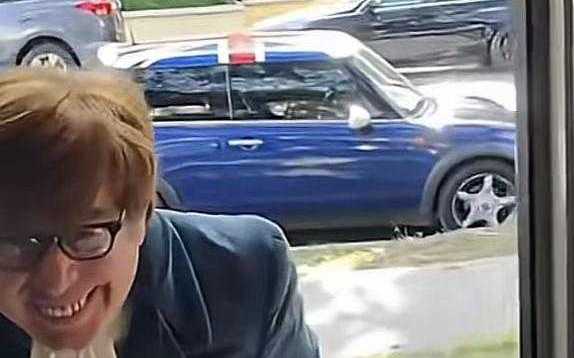WHO just made a historic declaration about the status of Ebola in Guinea.
Guinea is officially Ebola-free.
Meet Noubia, the adorable little cutie in the photo below.
Photo by Cellou Binani/AFP/Getty Images.
She was just 34 days old when this picture was snapped back in November 2015, so she probably won't be able to recall all the hoopla over this photo when she grows up. But the picture, nonetheless, will go down in history.
Why? The photo captures the exact moment when Noubia, the last known patient to contract Ebola in Guinea, was released from care after being treated for the deadly disease.
Noubia's prognosis last month means her home country has officially turned a very big corner in the fight against Ebola.
Guinea was declared Ebola-free by the World Health Organization on Dec. 29, 2015.
Two 21-day incubation periods have passed since the last known patient — in Guinea's case, Noubia — has tested negative for Ebola a second time, according to the World Health Organization.
This is a big deal — not just for Guinea, but for all of West Africa. It's the first time the three hardest hit countries — Guinea, Liberia, and Sierra Leone — "have stopped the original chains of transmission that were responsible for starting this devastating outbreak two years ago,” Dr. Matshidiso Moeti, WHO Regional Director for Africa, said in a statement.
Photo by Cellou Binani/AFP/Getty Images.
Guineans are preparing to celebrate the declaration and ring in 2016 with fireworks and concerts, BBC News reported.
"It's the best year-end present that God could give to Guinea, and the best news that Guineans could hope for," Alama Kambou Dore, an Ebola survivor, told AFP News agency.
The celebrations come after two years of immeasurable heartache in Guinea.
The virus has ravaged West Africa since the chain of infections began in December 2013, causing about 11,300 deaths worldwide.
More than 2,500 of them have been in Guinea.
An Ebola patient sits at a treatment center in Guinea in 2014. Photo by Kenzo Tribouillard/AFP/Getty Images.
While the WHO's declaration of an Ebola-free Guinea is more than welcome, it certainly doesn't mean the country can let down its guard just yet. In fact, Guinea now enters a three-month period of heightened surveillance to make sure any new cases are quickly identified and treated immediately before spreading to other patients.
"The coming months will be absolutely critical," said Dr. Bruce Aylward of WHO's Ebola response team. "This is the period when the countries need to be sure that they are fully prepared to prevent, detect and respond to any new cases."
Liberia, for instance, was declared Ebola-free back in September, but has had two cases crop up since then.
But for now, Guineans have every reason to celebrate.
The coming year will bring a "full health sector recovery agenda" to Guinea, Liberia, and Sierra Leone, the WHO reports, noting that they'll focus mostly on vital public programs, like maternal and child health, and on pinpointing any Ebola flare-ups down the road.
You are just the cutest, Noubia. Photo by Cellou Binani/AFP/Getty Images.
Dr. Rick Brennan, a member of WHO's Ebola response team, told The New York Times that the declaration serves as a great moment to build on the significant progress that's been made.
“It’s important to take a pause and be thankful for where we’ve arrived at and get to work rebuilding that health system and making it more resilient for the future."






 A woman is getting angry at her coworker.via
A woman is getting angry at her coworker.via  A man with tape over his mouth.via
A man with tape over his mouth.via  A husband is angry with his wife. via
A husband is angry with his wife. via 
 Austin Powers impersonator arrives at Chase Hofer's apartment.Photo Credit: Kenneth Webb, TikTok
Austin Powers impersonator arrives at Chase Hofer's apartment.Photo Credit: Kenneth Webb, TikTok
 Mom hugging crying daughter
Mom hugging crying daughter Dad kissing child on cheek
Dad kissing child on cheek Mom comforting daughter
Mom comforting daughter

 A blue light painting of an infinity symbol. Photo by
A blue light painting of an infinity symbol. Photo by